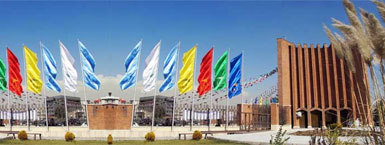Condensed Matter Physics
Condensed matter physics is the field of physics that deals with the macroscopic and microscopic physical properties of matter. In particular, it is concerned with the "condensed" phases that appear whenever the number of constituents in a system is extremely large, and the interactions between the constituents are strong. Condensed Matter Physics investigates how matter arises from a large number of interacting atoms and electrons, plus what physical properties it has as a result of these interactions. Our vision is to foster the individual growth of our students, so they will insightfully and effectively contribute to society, academia, and industry. Our aim in this field is to develop and probe quantitative and microscopic theories of condensed matter systems, both theoretically end experimentally. In theory, we use models that range from the electronic to atomic scale, and beyond. Methods and software are being developed for atomic-scale modeling of complex multi-component materials and are applied to a multitude of materials and material properties. In experiment, we synthesize and measure interesting materials with real-world applications in mind. We have a great range of facilities in order to make and measure these systems. Condensed matter physics group at Tarbiat Modares University is active in two fields: "Hard Condensed Matter" and "Soft matter and Statistical Physics". Hard Condensed Matter generally refers to materials with a rigid structure such as crystalline solids and glasses like metals, insulators, semiconductors and superconductors. The term "hard" mostly refers to systems in which quantum mechanical effects play an important role. In Soft Matter Physics, we deal with systems that are easily influenced by mechanical or thermal stresses, such as liquids, colloids, polymers, gels, foam, granular materials, liquid crystals, and biological materials. Using classical mechanics, equilibrium and non-equilibrium statistical mechanics, the theory of symmetry breaking, and finite-scale physics, researchers in this field study the novel and non-natural phenomena appearing in these materials. Our laboratories are well equipped with a range of facilities for synthesis and characterization of advanced materials including more than 6 furnaces and ovens, ultrasonic bath/mixers, a variety of heater/stirrers, fume hoods, vacuum systems, I-V characterization, VSM, AC-susceptibility, low-temperatures measurements, potentiostat, sun-simulator, Photoluminescence, and UV-Vis spectrometer. Our group consists of theoretical and experimental subgroups that include approximately (thirty) graduate students and post-doctoral fellows. Two main goals of the group are to participate in advancing the condensed matter field and to help interested graduate students become expert researchers. We take active part in TMU postgraduate educational programs. Our students gain experience in advanced theory and simulation, developing strong analytical, computational, and problem-solving skills along the way as well as getting involved in a great variety of experimental techniques and applied projects. They are exposed to collaborative efforts, often within our international research networks. |




